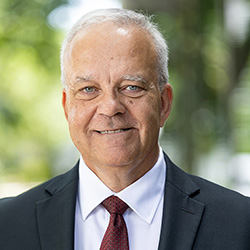
I’ve been on the job for a little over five months now, but to the vast majority of you, I’m still “the New Guy.” So with that in mind, I thought I should begin my first column in Freeman Business by telling you a little about myself, why I’m so excited to be dean of the Freeman School, and what I’ve been doing for the past several months.

Paulo Goes
I came to Tulane and the Freeman School in August from the University of Arizona, where I spent five years as dean of the Eller College of Management and eight years prior to that as a professor and head of Eller’s Management Information Systems department. During my time at Arizona, I worked with our stakeholders to develop an interdisciplinary vision for the future of business education in a fast-changing world. Our online MBA became a U.S. News & World Report Top 10 program; we launched highly successful online master’s programs in healthcare management, accounting, cybersecurity and entrepreneurship; and we introduced successful STEM master’s programs in business analytics and economics. At the same time, we built strong partnerships with the business community and developed collaborations with schools and colleges across the university.
Back in the spring, when I was first contacted about the possibility of joining Tulane and began to learn more about the university and the Freeman School, my wife asked me why I was interested in the opportunity. I smiled and told her it was “the three Ps,” but I wasn’t referring to marketing. It was the people, the principles and the potential.
All the people I met during the interview process, from President Fitts to deans, faculty and staff members, were highly impressive — smart, energized and dedicated. The principles of Tulane University also appealed to me. This is an institution that prioritizes academic excellence and student centricity, and these commitments drive every decision.
The final P — and the most significant in my mind — was the potential.
The world is changing at breathtaking speed. Big data, automation, artificial intelligence, robotics — advances like these are changing business and transforming the workplace. To prepare students to compete in this new and unpredictable landscape, higher education needs to be responsive, and the more I learned about Freeman, the more I recognized that it has all the ingredients necessary to thrive in this new environment: A focus on experiential learning, low barriers to collaboration with other units across the university, and a strong emphasis on the most critical human capabilities — communication skills, teamwork, problem solving and design thinking. This is the future, and the future is already happening at Freeman.
When you combine these advantages with other factors — like our outstanding teaching and research faculty, our state-of-the-art facilities, our strong undergraduate enrollments, and our highly accomplished and uncommonly dedicated alumni base — Freeman is a uniquely special place and I couldn’t be happier or more excited to be chosen to lead us into the next phase of growth.
My first day on the job was Aug. 23; six days later, Hurricane Ida struck New Orleans. While this wasn’t the welcome I was hoping for, I’ve been told that experiencing a hurricane is a rite of passage for every Tulane dean, so I’m happy to have gotten it out of the way early. Since then, I’ve been meeting with faculty, staff, students, alumni and other stakeholders and listening closely to their ideas on what we can do to enhance and expand our offerings and better fulfill our mission as an institution.
In October, I hosted a leadership retreat with senior administrators, directors and department heads to discuss and organize these ideas, and in November, we announced the formation of a series of task forces charged with exploring how we can grow and improve our activities in seven strategically important areas: Experiential Learning, Online Programs, Business Minors, the Full-Time MBA Program, Graduate Programs, the PhD Program and Organizational Excellence. These task forces comprise tenure-system faculty, professors of practice, administrators, staff and students, and they’ve been meeting regularly since December. The goal for each is to gather information and provide me with a list of specific recommendations no later than April 1. In the coming months, I hope to share more information with you about their progress as we continue to develop a strategic plan to guide us through this volatile period in higher education.
In the meantime, I want to thank you for welcoming me so warmly to New Orleans and the Freeman School. As we continue to emerge from the pandemic, I look forward to meeting you in person and sharing all the wonderful things taking place here at Freeman.

